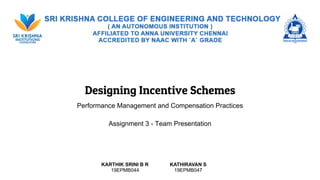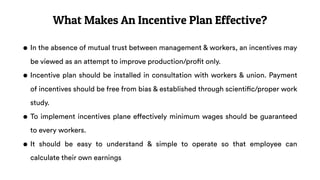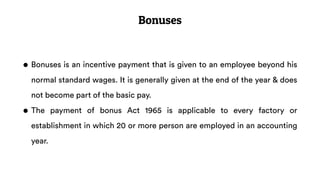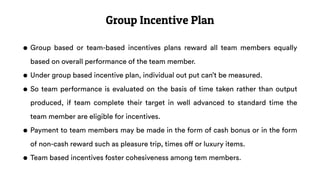Deciding Incentive Schemes
- 1. Designing Incentive Schemes Performance Management and Compensation Practices Assignment 3 - Team Presentation KARTHIK SRINI B R 19EPMB044 KATHIRAVAN S 19EPMB047
- 2. Incentives
- 3. Incentives • The term INCENTIVES mean, something which encourages a person to do something. Or the “extra financial reward/ motivation”. • Incentives is the performance-link reward to improve motivation & productivity of the employees. • Incentives includes all that provide extra pay for the extra performance in addition to regular wages for the job.
- 4. Why Incentives Are Important?
- 5. Why Incentives Are Important? • Workers are likely to work at their best when they are offered monetary rewards for good performance. • Provide opportunity for hard-working & ambitious employees to earn more. • To improve work-flow, work methods & man – machine relation ship. • To bring employee involvement to make employee innovative.
- 6. Why Incentives Are Important? • Incentives are the sound technique of improving productivity. • Help to improve discipline and industrial relation. • The cost of supervision are reduced. • To obtain desired result.
- 7. What Makes An Incentive Plan Effective?
- 8. What Makes An Incentive Plan Effective? • In the absence of mutual trust between management & workers, an incentives may be viewed as an attempt to improve production/profit only. • Incentive plan should be installed in consultation with workers & union. Payment of incentives should be free from bias & established through scientific/proper work study. • To implement incentives plane effectively minimum wages should be guaranteed to every workers. • It should be easy to understand & simple to operate so that employee can calculate their own earnings
- 9. What Makes An Incentive Plan Effective? • It should provide equal opportunity to all workers to earn incentives pay. • Plan should not be very costly in operation. • Plan should be flexible to adopt any changes later on. • Payment of incentives should be prompt i.e. as early as possible. • It should be adequate to motivate each employees. • Every plan should be reviewed periodically.
- 10. Basic Forms Of Incentives
- 11. Bonuses • Bonuses is an incentive payment that is given to an employee beyond his normal standard wages. It is generally given at the end of the year & does not become part of the basic pay. • The payment of bonus Act 1965 is applicable to every factory or establishment in which 20 or more person are employed in an accounting year.
- 12. Merit Pay • Merit pay is a reward based pay on haw well an employee done the assigned job. Higher the performance Greater will be the reward. • The payment is depend on individual employee’s performance.
- 13. Commissions Commission for sales people is paid on the basis of sales made by the employee, through different plan. Such as, • Salary Plan : where new salesman is appointed, is unable to generate new. • Commission Plan : where organisation is totally based on sales of their product. • Combination Of Both : is the most frequently used method.
- 14. Classification Of Incentive Plans
- 15. Classification Of Incentive Plans Individual Incentive Plan Time Based Output Based
- 16. Classification Of Incentive Plans Organisation Wide Incentive Plan Profit Sharing Co-Partnership Gain Sharing ESOPs
- 17. Classification Of Incentive Plans Group Incentive Plan Time Based
- 18. Individual Incentive Plan Time Based Incentive Plan – Under time based plan, per hour wage rate is determined & incentives paid on the bases of time saved. – Time based incentive plan is divided in four different ways. – Hasley Plan, Rowan Plan, Emerson Plan, Bedeuax Plan. – All these plans more or less follow the same method i.e. (pay bonus on the basis of timed saved by employee), but with different formula.
- 19. Individual Incentive Plan Output Based Incentive Plan – Under output based plan, per piece wage rate is determined & incentives paid on the bases of output produced. i.e. more output in standard time or standard output in less time. – For output based incentive following three methods can be used. – Taylor Plan, Merrick Plan, Gnatt Plan.
- 20. Organisation Wide Incentive Plan Profit Sharing – Profit sharing is an arrangement by which employees receive in addition to wages, a share is fixed in advance in profit of the enterprise. – It is an agreement between employer & his employee. – According to International Labour Organisation, “Profit-sharing is a method of industrial remuneration under which an employer undertakes to pay to employee, a share in net profit of the enterprise in addition to regular wages”
- 21. Organisation Wide Incentive Plan Co-Partnership – Co-partnership is an extension of profit-sharing. – Under this method worker’s share in company’s profit is paid in the form of share by which they become entitled to participate in decision-making process.
- 22. Organisation Wide Incentive Plan Gain Sharing – This method aims at increasing productivity & decreasing labour cost & sharing the result gains wit employee. – It is based on a mathematical formula which compares a standard perform with actual performance during given period. – When actual performance exceed the standard performance, shaving are shared with employees.
- 23. ESOPs (Employee Stock Option Plans) ESOPs (Employee Stock Option Plans) – This method is originated in the USA in early 90s. – Under this plan, the eligible employee are allotted company’s share below the market price. – The term “stoke option” implies the right of eligible employee to purchase a certain amount of stoke in future at an agreed price. – The eligibility criteria may include length of service, contribution to the department etc.
- 24. Group Incentive Plan • Group based or team-based incentives plans reward all team members equally based on overall performance of the team member. • Under group based incentive plan, individual out put can’t be measured. • So team performance is evaluated on the basis of time taken rather than output produced, if team complete their target in well advanced to standard time the team member are eligible for incentives. • Payment to team members may be made in the form of cash bonus or in the form of non-cash reward such as pleasure trip, times off or luxury items. • Team based incentives foster cohesiveness among tem members.
- 25. Group Incentive Plan Methods for team based incentives plans are, – Preistman’s production plan – Rucker plan – Scalon plan – Town plan and so on.
- 26. Thank You


























